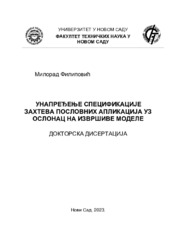Prikaz osnovnih podataka o disertaciji
Unapređenje specifikacije zahteva poslovnih aplikacija uz oslonac na izvršive modele
Improving the Specification of Business Application Requirements Based on Executable Models
| dc.contributor.advisor | Milosavljević, Gordana | |
| dc.contributor.other | Sladić, Goran | |
| dc.contributor.other | Dejanović, Igor | |
| dc.contributor.other | Savić, Goran | |
| dc.contributor.other | Vujović, Vladimir | |
| dc.contributor.other | Milosavljević, Gordana | |
| dc.creator | Filipović, Milorad | |
| dc.date.accessioned | 2024-02-14T15:01:20Z | |
| dc.date.available | 2024-02-14T15:01:20Z | |
| dc.date.issued | 2024-01-22 | |
| dc.identifier.uri | https://www.cris.uns.ac.rs/DownloadFileServlet/Disertacija169398938585291.pdf?controlNumber=(BISIS)133103&fileName=169398938585291.pdf&id=21966&source=NaRDuS&language=sr | sr |
| dc.identifier.uri | https://www.cris.uns.ac.rs/record.jsf?recordId=133103&source=NaRDuS&language=sr | sr |
| dc.identifier.uri | https://www.cris.uns.ac.rs/DownloadFileServlet/IzvestajKomisije169398944203686.pdf?controlNumber=(BISIS)133103&fileName=169398944203686.pdf&id=21967&source=NaRDuS&language=sr | sr |
| dc.identifier.uri | https://nardus.mpn.gov.rs/handle/123456789/22232 | |
| dc.description.abstract | Istraživanje predstavljeno u okviru ove disertacije imalo je za cilj unapređenje procesa specifikacije korisničkih zahteva poslovnih aplikacija na bazi detaljnih, izvršivih prototipova koji se mogu kreirati uz minimalan utrošak vremena i energije. Radi postizanja ovog cilja je implementiran alat otvorenog koda pod nazivom Kroki (fr. croquis – skica) čija je arhitektura projektovana tako da obezbedi: (1) kolaborativni razvoj specifikacije poslovne aplikacije sa korisnicima koji nemaju znanje projektovanja i programiranja softverskih sistema, (2) efikasno pokretanje prototipa direktno iz sopstvenog razvojnog okruženja, dajući mogućnost korisniku da isproba prototip tokom modelovanja kad god poželi, (3) ponovno korišćenje informacija dobijenih prilikom razvoja prototipova u kasnijim fazama razvoja, kako bi se smanjilo nepotrebno trošenje resursa. Eksperiment za proveru da li razvijeni alat zadovoljava postavljene ciljeve je dizajniran kao serija od deset eksplorativnih studija slučaja čiji je cilj specifikacija poslovnih aplikacija sa učesnicima koji dolaze iz različitih poslovnih domena koji nisu poznati projektantima. Pojedinačne studije su obavljene sa po jednim učesnikom u okviru dvočasovnih projektantskih sesija, gde su ulogu projektanata imali autor ove disertacije i njegov mentor. Kvalitativni i kvantitativni podaci prikupljeni tokom sesija i posle njih, putem upitnika, su iskorišćeni za izvođenje pozitivnih zaključaka o efikasnosti predloženog pristupa i alata. Dizajn istraživanja je baziran na konceptima MEM-a (Method Evaluation Model) koji definiše kriterijum za uspeh određene metodologije u praksi. Upitnici koji evaluiraju jezik za modelovanje i Kroki alat su formulisani tako da odgovaraju izabranim konceptima FQUAD (Framework for qualitative assessment of domain-specific languages) okvira za evaluaciju jezika specifičnih za domen. | sr |
| dc.description.abstract | The research presented in this dissertation aimed to improve the process of specification of user requirements of business applications based on detailed, executable prototypes that can be created with minimal expenditure of time and energy. To achieve this goal, an open-source tool called Kroki (fr. croquis - sketch) was implemented, the architecture of which is designed to provide: (1) Collaborative development of business application specifications with users who do not have knowledge of designing and programming software systems, (2) Efficient prototyping directly from Kroki’s development environment, enabling the user to try out the prototype during modeling whenever they want, and (3) Reuse of information obtained during the development of prototypes in later stages of development, to reduce unnecessary consumption of time and energy. The experiment to validate whether the developed Kroki tool meets the set goals was designed as a series of ten exploratory case studies to specify business applications with participants from different business domains unknown to the designers. Individual studies were carried out within two-hour design sessions, where the author of this dissertation and his mentor played the designer role, with a single participant in the user role in each session. Qualitative and quantitative data collected during and after the sessions, through questionnaires, were used to draw positive conclusions about the effectiveness of the proposed approach and tools. The research design is based on the concepts of MEM (Method Evaluation Model), which defines the criteria for the success of a certain methodology in practice. Questionnaires that evaluate the modeling language and the Kroki tool are formulated to correspond to the selected concepts of the FQUAD (Framework for qualitative assessment of domain-specific languages) for evaluating DSLs. | en |
| dc.language | sr (latin script) | |
| dc.publisher | Универзитет у Новом Саду, Факултет техничких наука | sr |
| dc.rights | openAccess | en |
| dc.source | Универзитет у Новом Саду | sr |
| dc.subject | Razvoj softvera vođen modelima, softverski prototip, inženjerstvo zahteva | sr |
| dc.subject | Model Driven Software Development, software prototype, requirements engineering | en |
| dc.title | Unapređenje specifikacije zahteva poslovnih aplikacija uz oslonac na izvršive modele | sr |
| dc.title.alternative | Improving the Specification of Business Application Requirements Based on Executable Models | en |
| dc.type | doctoralThesis | sr |
| dc.rights.license | Attribution-NoDerivs | |
| dc.identifier.fulltext | http://nardus.mpn.gov.rs/bitstream/id/159640/Disertacija_15085.pdf | |
| dc.identifier.fulltext | http://nardus.mpn.gov.rs/bitstream/id/159641/Izvestaj_komisije_15085.pdf | |
| dc.identifier.rcub | https://hdl.handle.net/21.15107/rcub_nardus_22232 |



